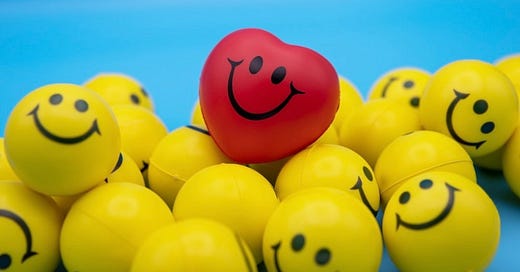For many years, I took the train to work. A fellow commuter (I’ll call her Jane) endlessly complained about the poor punctuation of the service. Jane was intent on claiming as much compensation as she could from the train operator. To that end, every day she recorded on a spreadsheet how late her trains were. She was due to go on holiday and asked if I would keep a note of delays during the week. Reluctantly, I agreed. When Jane returned from holiday, she asked me for an update. However, I had totally forgotten to keep a record. Rather than admit my oversight, I told her the trains had run perfectly on time through the week. It had never happened before. Jane, as you can image, was delighted. She did not ask me again. I often think, if I’m too happy then Jane could sort me out.
Variables of happiness
Happiness is often described as a state characterised by positive emotions, satisfaction and a sense of purpose. I know that happiness cannot be strictly defined as a mathematical formula. However, as an aging Mathematician, perhaps you will humour me. As in algebra, where variables represent unknown quantities, happiness is influenced by factors that interact in complex ways. Making positive changes in any aspect can have ripple effects. The variables of happiness include: Purpose, Relationships, Health, Gratitude, Growth and Resilience.
Purpose
The purpose of life is to enjoy the passage of time. - Jimmy Carr
Having a sense of purpose gives us direction and motivation. Whether it's through work, hobbies or other activities, aligning actions with our values and passions brings a profound sense of fulfilment.
I love seeing people use things I build. A combination of commercial and IT skills enabled me to develop a tool that significantly improves the way my corporate colleagues work.
Relationships
I am self-motivated and very happy working alone. That said, without my family and friends much of my drive and sense of purpose would diminish. Supporting my children and seeing them develop into amazingly talented adults is a huge pleasure. Strong relationships are crucial to my happiness.
Health
A healthy person wants a thousand things, a sick person only wants one. - Confucius
At age 35, when commuting home by train, I was convinced I was having a heart attack. At Reading station I sought help and an ambulance was called. At the scene, paramedics used an ECG to check my heart. I was then taken to the local hospital for further tests. After an overnight stay, I was told my heart was healthy and I could go home. Subsequently, I went to my GP who told me the likely cause of the pain was related to some DIY I had undertaken. Since that event, I have not taken my health for granted. Daily walks help me stay happy and healthy.
Gratitude, growth and resilience
Listening to the BBC Podcast A History of Britain in Numbers made me realise how lucky I am to have been born in a safe country in the 1960s. Central heating, showers, computers, mobile phones, social media, Wifi, the internet and AI. All things that enrich my life daily that my grandparents could hardly imagine.
I struggled at school. Maths and woodwork were the only things I was good at. In my 30s, I discovered books and embraced the idea of life long learning. I am working my way up Maslow’s Hierarchy of Needs. I am particularly enjoy learning new things and sharing my understanding with other, e.g. via this blog.
While incredibly fortunate, I have faced many setbacks, including redundancy and the death of my mum and a close friend. Pragmatic optimism and a supportive network helped me. I feel more resilient and grounded, having come through these challenges.
Other resources
Happiness is a Choice talk by Naval Ravikant
Life Games to Play, Win and Exit post by Phil Martin
Pick Ourselves post by Phil Martin
The following may not be applicable to everyone. However, for me, I buy into Naval Ravikant’s view that, Happiness is a choice we make and a skill we develop.
Have fun.
Phil…




